The Legend of Zelda: Female Representation
*Spoilers for the Legend of Zelda Franchise*
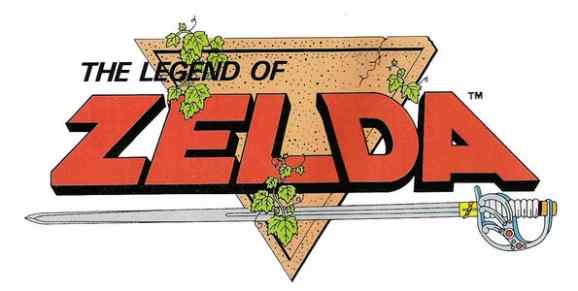
Since the first game’s release in 1986, Shigeru Miyamoto and Nintendo’s The Legend of Zelda has served as an astounding conundrum to gamers and new gamers worldwide. The title suggests it is a game revolving around a person, place, or thing named Zelda, but – in fact – the aforementioned Zelda is a plot device to push the game forward. Princess Zelda has existed in a multitude of incarnations throughout the franchise and, usually, in the form of a “damsel in distress.” Even when she has an opportunity to be powerful, her autonomy is taken by the patriarchy. The E-3 announcement for the next Legend of Zelda game spurred discussion for a heroine playing the protagonist rather than Link. Unfortunately, this was nothing more than hearsay, as an article on Gamespot points out that the protagonist is, in fact, Link.
This is disappointing. For years the franchise has grown and given more power to women, but never quite enough. The issues revolving around feminism in The Legend of Zelda does not primarily exist in Zelda’s character, but throughout the entire franchise.
The Three Goddesses
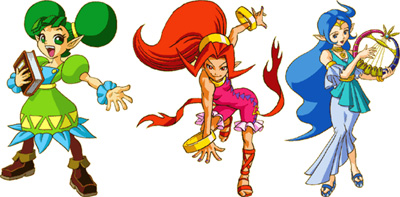
Din, the goddess of power, created the land. Nayru, the goddess of wisdom, created order. Farore, the goddess of courage, created the diverse inhabitants. Upon leaving the world, the goddesses left behind the Triforce: three golden triangles. It is said that any wish the possessor of the Triforce desires will come true…(Thorpe)
The Three Golden Goddesses are at the pinnacle of power in the Zelda universe. Although their existence has fallen to that of legend, the effect they have had on the Zelda universe is evident in the cycle of war perpetuated through the existence of the Triforce. It is unfortunate that such powerful beings are degraded into damsels to be saved in The Legend of Zelda: Oracle of Seasons (2001) and The Legend of Zelda: Oracle of Ages (2001).
In Oracle of Seasons, Din is an enchanting dancer in the land of Holodrum that appears to have feelings for Link. In reality, she is an omnipotent oracle of seasons that, as the name implies, controls the four seasons in Holodrum. However, the power to control the different seasons does little for her as she is literally whisked away by Onox, General of Darkness. The rest of the game is entirely dependent on Link’s own ability to save Din.
The Oracle of Ages is the sister game to Oracle of Seasons in form as well as function. In order to get 100% percent completion in either game you must first beat one and then use a code to beat the other. While this may sound fun, it is problematic how yet another goddess is degraded through her characterization. In Oracle of Ages, Nayru is a gentle singer in the land of Labrynna that also seems to have strong feelings for Link. She is captured by the evil sorceress Veran because Nayru is actually the Oracle of Ages, and capable of governing the passage of time in Labrynna.
In either game, there is also an Oracle of Secrets named Farore. Her role within the game is more helpful than the previously mentioned oracles, but a lot less active in contributing to the game. She essentially exists if the players wish to have any extra oomph added to their game but she is not necessary.
While the two games are fun in their own right, it’s embarrassing that the creators of the universe have fallen from power. The Zelda franchise took a step in the right direction by placing creationism in the hands of women, but then it took a hundred steps back when these games were conceived. And no woman is spared from these same choices.
The Goddess Hylia
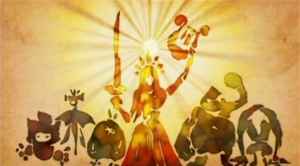
The Goddess, Hylia is the creator of humans in the Zelda Universe. The Goddess is an unsung heroine mentioned for the first time in The Legend of Zelda: Skyward Sword (2011). She is responsible for taking the humans to Skyloft to protect them from Demise. After doing so, she united with the creatures dwelling on the land below and sealed away Demise. However, her success is only temporary. Hylia’s battle would then pass on to a boy (Link) and a girl (Zelda) destined to save the world.
In the manga made for the 25th anniversary special, Hylia’s power is evident. With the master sword she single-handedly rends a chunk of earth and sends it to the Heavens so that she may protect her people. Link initially exists as a prisoner for supposed traitorous actions, but this was also planned.
Your imprisonment was willed by the Heavens. It was meant to make you strong. Like a sword hammered and honed so that it would never break. (Thorpe)
She did what was absolutely necessary to protect her people, and she takes it one step further to continue her defense of Hylia. She gives up her divinity so that she and Link would both be reborn whenever Hylia is in danger so they may protect it from Demise.Out of all of the characters, Hyila has the most potential to be great, but every reincarnation of Zelda does more than add a “human” factor to her character. Instead her reincarnation turns her into someone that (almost) constantly needs to be saved by Link.
Zelda
Princess Zelda is the human reincarnation of Hylia. Since the very first Legend of Zelda game she has been a damsel in distress. She is often a beautiful young maiden that is waiting for a daring hero to save her and it is only in her most recent forms that she takes a more active role in the world’s salvation. She is the bearer of the Triforce of Wisdom and, while she often needs Link’s help, she has all of the potential to be a very powerful female character.
1. Skyward Sword
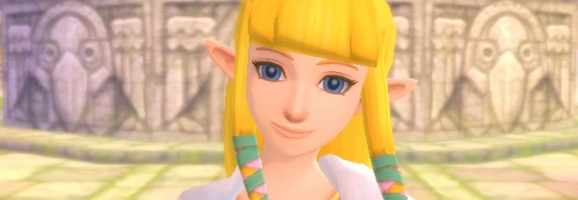
In Skyward Sword (2011), Zelda is the classic “girl next door.” According to the designers, Hirono and Kobayashi, they “wanted her to look like a typical village girl, but [they] also wanted to establish her as a heroine at the same time…[they] had a director who requested Goddess Zelda be ‘dressed simply, and in white'” (Thorpe).
Her character is spunkier than past versions of Zelda as she has no qualms with standing up to Link’s bullies, Groose and his gang. After being pulled to the surface world by a black tornado, Zelda finds herself on a quest to reawaken her memories as the goddess, Hylia. She gracefully accepts her fate and journeys alongside Impa, a servant to Hylia, so that she may reclaim her memories as Hylia.
This version of Zelda clearly has some power because she and Impa are able to journey through monster-infested temples with ease while Link must battle hordes of monsters and solve complex puzzles to reach the end. She is a responsible human that knows what she must do and does so gracefully, but she is still a female, and females in the Zelda verse are destined to need saving.
From Link and the player’s perspective, Zelda has been a damsel in distress. When Link journeys to the first two temples he is searching for his friend, Zelda, who is presumably in danger and must be saved. It is not until Link catches up to Zelda and learns of her true identity that Link realizes that Zelda had not needed him at all. At the precise moment this happens, Zelda and Impa escape into the past through the Gate of Time and Link seeks a way into the past to bring Zelda back to his own time. When he finally makes his way to the past, Zelda informs him of her true identity.
In order to protect the world and keep Demise imprisoned, Zelda seals herself in a crystal in the past and falls into a deep sleep. It is from this point onward that power is consciously given to Link.
Even though I am Hylia reborn, I am still my father’s daughter, and your friend. I’m still your Zelda… So I’m going to ask you a favor, sleepyhead. Ever since we were kids, I’d always be the one to wake you up when you slept in. But this time, when all of this is over, will you come to wake me up?
The rest of the game is less about Link’s journey to save Zelda, and more about his responsibility to the world. Zelda’s role is to sleep, and wait to be saved, a recurring theme in almost all Zelda games.
2. The Ocarina of Time
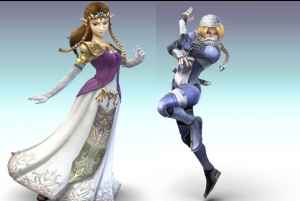
In Ocarina of Time (1998) Zelda takes a more active role in the salvation of Hyrule, and all of time itself. The first time that Link meets Zelda, she charges him with the job of saving Hyrule. At a very young age, the princess understands that Ganondorf is not to be trusted, and that something must be done. While at this time she lacks the ability to take direct action because of her societal position, she still has no qualms with sending a fellow child on the quest to save the world.
When Link arrives to open Sacred Realm and fully take on his role as the Hero of Time, Zelda is forced to escape from Hyrule in order to keep the sacred relic out of Ganondorf’s hands. She entrusts the Ocarina of Time to Link who uses it to open the Sacred Realm and unwittingly send the world into seven years of darkness.
After the seven year time skip, Zelda is nowhere to be seen. Instead, Link is guided by Sheik, a young man from the Sheikah tribe. Zelda disguises herself as Sheik so that she may take a more active role in helping Link towards his destiny. Every time Link searches for a temple Sage, Sheik is there to guide him and teach him what to do. So there is only one question, why become a guy?
If Zelda could not travel as the princess, why couldn’t she disguise herself as a female sheikah with the same capabilities? It would seem that the only way that Zelda could have any form of autonomy is by disguising herself as a man. In a world dominated by men: the king, Ganondorf, Link, etc. Zelda had to, almost literally, become one to function in this world. Upon first glance, this is not problematic. However, the moment Zelda reclaims her identity, Ganondorf kidnaps her and Link must climb Ganondorf’s tower to save her. In a patriarchy, the “dashing hero saves the princess”, but a man like Sheik doesn’t need any saving.
3. Wind Waker
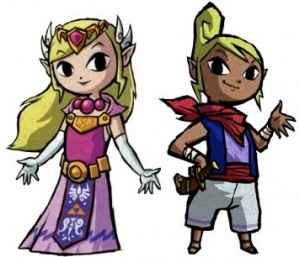
In Wind Waker (2003), Zelda is first introduced as a scrappy, clever pirate by the name of Tetra. In her first appearance, she must be saved by Link but this “damsel in distress” trope is immediately turned around by Tetra’s own capabilities. Unlike other princesses who are trapped in castles and forced to wait, Tetra dictates her own choices and actions.
Do you understand what you’re asking? We’re pirates! You know… PIRATES! The terror of the seas!
Her authoritative position actually gives her power over a crew entirely composed of men, and she is not afraid to do what is necessary to help Link on his quest. She also is not afraid to do something for herself. Upon saving Link’s sister, Arya and two other girls from Windfall Island, Tetra manages to take all of the profit she can from the deal. She isn’t limited by the need to serve anyone but herself and to present herself as a worthwhile captain. Tetra is likable in a variety of ways, and she did more to help Link as Tetra than previous incarnations of Zelda. She even stands up to Ganondorf without fear or worry for her own safety. What ruins Tetra is her transformation into Zelda.
When descending under the ocean to Hyrule, Zelda’s true destiny is revealed. Instead of sailing the seas, she is kept holed up in Hyrule to keep Ganondorf from taking her. Her character is ultimately weakened by this change, and even though she did not know who she was meant to be, she suddenly becomes apologetic for events that are out of her control.
Everything that’s happened to you and your poor sister.. it’s all been my fault. I’m sorry.
The game leaves room for Zelda to reclaim her “Tetra” persona in the end as she plays an active role in Ganondorf’s defeat, but it is not quite enough. Her character already lost a lot by being forced to wait.
4. Twilight Princess
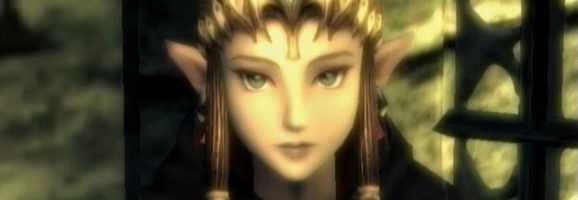
The Zelda from Twilight Princess (2006) exists only at the beginning and at the end. However, it is during this time that she takes a more active role in promoting a woman’s power than any other Zelda game. Link initially meets her as a wolf and Zelda initially exists as someone to deliver exposition. She tells the tale of Hyrule and its relationship with the twilight realm and she assists Link in restoring his true form. She is more than an informant though, she is truly the reason why Link can go on his quest at all.
With all of the wisdom that earns her the Triforce of Wisdom, Zelda understands Midna’s true identity and uses her power to give her life-force to Midna. While she may disappear after this moment, her selfless act sets in motion the steps necessary for Midna to ultimately save the Twilight Realm with Link’s help. Zelda’s final appearance has her fighting alongside Link to defeat Ganondorf with the light arrows. Initially she is possessed and forced to battle against Link, but she (although it is out of her control) is still doing more than staying in one spot.
What ultimately ruins this rendition of Zelda is that there is so little to say about her. She exists at the beginning and the end of the game but nothing more than that. It could be argued that this same issue revolves around all versions of Zelda, but this is most disappointing because this Zelda had the most potential. She has more maturity, and more capabilities than previous renditions. Unlike the Zelda from Ocarina of Time she embraces her womanhood, and unlike the Zelda from Wind Waker she does not allow a man to dictate her decisions.
Fi
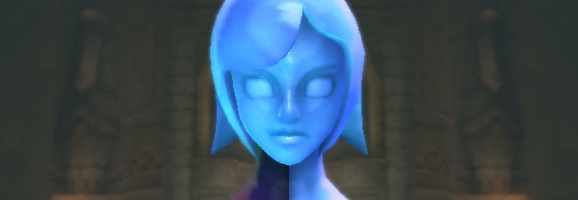
According to the Hyrule Historia, Fi’s early concepts were inspired by 1980’s anime shows. The idea was for her to be designed in “the style of beautiful secretary at the protagonist’s side.” Needless to say, she is not meant to be more than a “trophy” of sorts to travel around Link. What is most unfortunate about Fi is that she never had the opportunity to shine as well as she could have.
Fi was originally intended to be a battle partner to Link. For the first time in the history of the franchise there would be a female companion that did more than inform or annoy (think Navi). However, as the franchise has clung to a singular, fighting protagonist, Fi was tossed to the sidelines and maintained her role as a “beautiful secretary.”
The Gerudo
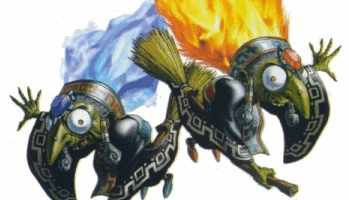
The Gerudo in Ocarina of Time have all of the potential to be powerhouses. The Gerudo women are thieves comprised almost entirely of women that live in the harsh conditions of the Gerudo Desert. When Link approaches the women in-game they capture and lock him away. Their toleration for an unwelcome, male presence secures their roles as feminist figures in the game. This would be splendid if it were not for their age-old tradition. Every hundred years, a male is born into their tribe and made king. In Ocarina of Time this particular male happens to be Ganondorf, the primary antagonist in Ocarina of Time.
The Gerudo clan features the Twinrova sisters. These women represent maternal instinct and precisely how far a woman would be willing to go for a child. According to Navi, the sisters together form Ganondorf’s surrogate mother. They happily capture Nabooru (the eventual Spirit Sage) and relentlessly battle Link in order to protect their loved one. While, on one hand, it would seem that these two women are in the service of a man, it could be argued that they more accurately represent the best of maternal instincts. Although, while the sisters take an aggressive approach, another maternal figure has taken a variety of different forms throughout the franchise.
Impa
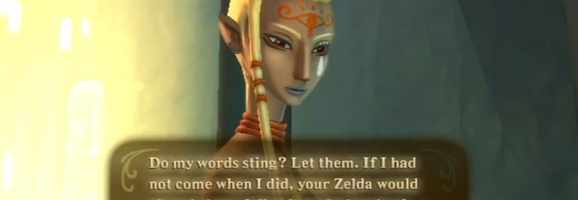
Impa has existed since The Legend of Zelda (1987). Initially presented as a mother-figure to Zelda, Impa has come a long way from the young princess’s nursemaid in 1986. Out of all the characters within Zelda she has the most potential to stand as a symbol for women everywhere.
The original Impa in The Legend of Zelda, Impa is displayed as nothing more than a servant. She sets Link on his adventure but does little else. In Zelda II: The Adventures of Link, Impa takes a slightly more proactive role. Instead of merely asking Link to save Hyrule, she elaborates on Link’s destiny to save Hyrule and serves as Link’s guide. It is when Ocarina of Time is released that Impa is presented as more than a guide.
In Ocarina of Time, Impa is presented as a thinner, younger woman sworn to protect Princess Zelda. She is one of the last surviving members of the Sheikah tribe. Impa’s personality is more three-dimensional than previously mentioned characters. She opened up the former Sheikah town, Kakariko village, to non-Sheikah and offered up her home as a safe-haven after Ganondorf took over Hyrule. She is a strong character with a maternal side, but most of all she is loyal to Zelda and concerns herself with Zelda’s well-being even as a sage.
The Impa in Skyward Sword is – within the timeline of the franchise – one of the earliest renditions of the character. She is a member of the Sheikah tribe who honors Hylia’s request to protect Zelda and escort the reincarnated goddess to the Earth Temple, the Sky Temple, and the Temple of Time. This rendition of Impa also has the pleasure of having two different versions of her character: the young and the old. The young Impa is unafraid to judge Link for his failures and is quick to chastise his ability to protect Zelda. She clearly has excellent fighting capabilities and her character, unlike other Impas, is not so quick to trust someone because of fate’s designs. The young Impa accepts her role to defend Hyrule to the extent that she waits for centuries while Zelda sleeps and waits for Link to wake her.
During her waiting period she ages severely and takes on the role of a seer at the Sealed Grounds in the Temple of Hylia. Instead of playing the cynical woman, she mentors Link and persuades Groose to assist in protecting Hyrule. While she is technically portrayed as two separate characters, the revelation that she is the old woman and Link’s mentor proves that she has had the most character growth of anyone in the series. Even Zelda in Ocarina of Time did not change in character as much as Impa did.
Midna
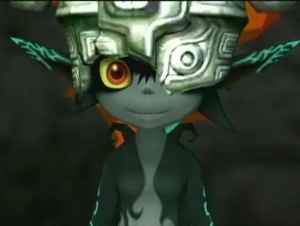
In Twilight Princess (2006), Midna is introduced as a female lead unlike any other. She is mischievous, cynical, and unafraid to take control. From the beginning of the game she delights in Link’s form as a wolf, and – unabashed – mounts and rides him. Midna is a step in the right direction as, while she is dependent on Link, she is primarily using Link for her own ends. That is not to suggest that “women in power use men.” Instead Midna’s role is fantastically pro-active and she does not merely stand on the sidelines and waits for what is going to happen.
Prior to the events in Twilight Princess, she was chosen over Zant to rule the Twilight realm as she promotes peace and harmonious living over the war that Zant wanted against the Light realm. In revenge, Zant turns Midna into the impish form that fans are familiar with and Midna works with Link to restore her true form and her realm. Midna exists as the character that Zelda should have been all along, a useful companion capable of fighting and informing.
Her character is another excellent example of someone that exists in more than two-dimensions. She is a ruler that has had her entire world taken from her and she insists on taking it back at whatever cost. Yet, she is more than her heartbreak and cynicism. When she feels ready she openly apologizes to Link for everything her actions have put him through (actions that she was aware of from the beginning) and she continues to work with him for the benefit of everyone. Her character is clever, entertaining, and – most of all – interesting and the series would benefit from more characters like Midna.
There has been a definite progression in female representation in The Legend of Zelda franchise, but there can be so much more done. With the impending release of Hyrule Warriors Aonuma has claimed that he is open to having more female playable characters in Hyrule Warriors. However, this seems to be more in the interest of selling more copies than the interest of gender representation. That is not to say that Nintendo is necessarily “anti-feminist”, but more so that it is a company produced by and for the patriarchy.
In Conclusion
The gaming industry has catered to the patriarchy for many years. From the impractically dressed fighters in games like Street Fighter to the classic damsel in distress trope in the original Donkey Kong (1991) arcade game, women have not been given many opportunities to show what they can do. While The Legend of Zelda attempts to rectify this issue by providing a matriarchal society. However, the fact is that this game was created by men establishes certain tendencies. The male hero saving the princess implies that women always need to be saved by a man.
When a man is playing, he can feel more represented by the player character than a woman playing might (Shreier).
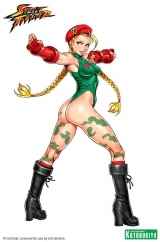
This mentality creates the dichotomy between “real” gamer girls and “false” ones. The lack of respect for women in the gaming industry divides males and females, and females with each other. These types of games perpetuate endless stereotypes and destroy the identity of the modern female. Even the women that are very capable of fighting are hyper-sexualized and reduced to objects.
Male service has run rampant within the games and a Legend of Zelda game that features a female protagonist would be a brilliant step (provided that she is acknowledged for her abilities and not for her looks). Doing so would not take away from the gaming experience, in fact, it could very well enhance it. Zelda’s character obviously has plenty of capability. However, after almost 30 years of expectations, the odds of this happening is slim to none. Instead, Zelda should be able to play a more active role without needing salvation. As the bearer of the Triforce of Wisdom, she clearly has capabilities beyond that of Ganon or Link, and it’s time she and other females take a step into the forefront of change.
Works Cited
Patrick, Thorpe. Hyrule Historia. Milwaukie, OR: Dark Horse Books, 2013. Print.
Schreier. “Aonuma Says He’s Open to Playable Female Characters in Zelda Wii U, If Hyrule Warriors Goes Down Well.” My Nintendo News 18 June 2014: n. pag. Print.
What do you think? Leave a comment.




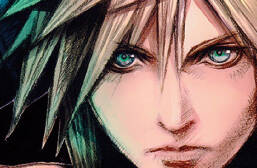






Gaming overall needs more representation and diversity, but I don’t see it being championed by Zelda.
No female I know honestly cares or feels left out when they are forced to play as a male character.
Ah, thank you Ken! You’ve solved the problem! I guess you wouldn’t feel left out if all of the CoD games featured Barbie playable characters and NPC. Oh, wait…no, you wouldn’t feel left out because that would cater to the male gaze. Interesting dichotomy, isn’t it?
Or maybe Ken, because of your arttidue they feel they can’t mention it to you? When I play games where you can choose your character, I will choose both male and female characters depending on my mood. But when companies choose for you and always have the male protagonist, it gets very annoying. This world is 50% women. (and even a small % that is neither woman nor man…)
To be fair, the female representation in the franchise has been relatively strong. I’ve come across debates of adding a female lead. The problem is with the idea that white male is the default, which is currently prevalent just about everywhere and in everything. It’s a really hard thing to rid yourself of. You remove the idea that any Link becomes the -insert race, gender, or whatever else here- Link if you just have more diversity in general. If you have more than one Link that is whatever. If you make OTHER characters different as well. No reason Zelda has to be white, as far as I am aware. No reason Impa or whoever has to be. As you add diversity, the ability to point out exceptions diminishes.
Yes Link can, in theory, be any race/gender/species/sexuality. That still doesnt change the fact that this Link is going to be a white male, just like the Link before.
Lovely article. Personally, I recognize that many women within the fanbase have no problem playing as male Link, and have grown very fond of the character. But I don’t think that discounts the possibility that many might also enjoy playing as a female character, and how many new fans it could attract, or even how much it might mean to girls everywhere to have a representative as the hero of one of the most prestigious and well known gaming franchises in the world.
Great analysis! I usually just lurk, but it was IMMENSELY interesting reading all of this.
We have to remember that the Zelda games are games made by Nintendo, a Japanese company, and not Western. If it was, like say made by an American company, then you could blame the female representation on eurocentrism, but since its Nintendo, the cultures are different.
This is very true, but keep in mind that Japan is still a patriarchal society, and as such, I believe his analysis holds.
I do really want a game with Zelda as the main character, not because I want to ‘throw the other side a bone’ but because I genuinely think she’s an interesting character. It would make for a better, more interesting, more unique game. Zelda’s abilities are much different from Link’s so the puzzles could be much different. Would be awesome to alternate between Zelda and Sheik to solve puzzles … Kinda like Majora’s mask. They could even take inspiration from other incarnations of Zelda like Tetra.
That sounds amazing!
Awesome that this is an article with some thought put into it, and not another “HURR IT’S SEXIST, ALL MALES ARE PIGS” bullshit.
Legend of Zelda is a wonderful series with a bountiful amount of courageous and strong women full of purpose. The games are more progressive than many other series. Women have roles of authority in every way in the Zelda universe (as goddesses, as matriarchs, as sages). Legend of Zelda is indeed feminist–or it’s getting there.
Just because it is less misogynist than other games doesn’t make it feminists. That’s like saying there is no segregation anyomore so racism doesn’t exist. Things are not as simple as falling into ‘misogynist’ and ‘feminist’ boxes. Perhaps we should aim for equality? Novel idea…
Zelda is certainly stepping forward and it’s a great game.
The focus of the games, to anyone but the most hard-core of the Zelda fandom, is what you do as Link and what events occur which directly affect what your objective is.
While Zelda may in fact be incredibly wise and possess powerful magical abilities in Ocarina of Time, the only effect she has directly on the player is that of support; telling him what he has to do and that he is her only hope. While the strength she shows as Sheik is great, and I don’t want to degrade how good of an idea it was, she does still end up helplessly getting put into a crystal right before the end of the game so Link has a further incentive to go to Ganon’s Castle immediately.
While Zelda is closer to empowering women than many other franchises, like Super Mario Bros, it’s definitely not a feminist game either. Women are not empowered in the game, they’re kidnapped and it is the man’s job to rescue them.
/Norig
Zelda is probably more sexist to males then females if you think about it. The gods are mainly female, the majority of the important people and sages are females. Human tribes such as the Sheikah’s and Gerudo besides the Hylians are mainly females. Link usually has more female friends and sidekicks then male ones. And the villains are usually males too. Oh and the holder of the Triforce of wisdom is female too. It’s like they only made the hero a male just to cut the guy’s some slack or something.
You have a valid point, however there should be nothing wrong with representation of women and men in video games except for the fact is that there are a lot of video games with hardly any women in them. LoZ is an exception and that’s wonderful, and it’s getting better. Games with a lot of men and a few women are not necessarily wrong, but its the idea that we live in an era where 51% of the world is female and we’ve yet to see a lot of games represent that. Games that have more of one gender compared to another are not bad games because of that fact, we simply need more of them on the other side of the spectrum, or with equal numbers.
I don’t think its sexist towards dudes in Zelda that there appear to be more women in powerful roles, just like it shouldn’t be sexist when there are more men in power than there are women. It’s simply the fact we need more games with more female representation to even out the spectrum.
in skyirm, and saints row, you can create characters that are men and women
Excellent article, Jemarc! I honestly have never known much about the Legend of Zelda franchise, but everything you touched on here is a lot of the reason why i haven’t ever bothered getting into gaming much. There needs to be a lot of changes in the industry, and perhaps conversations like this will get it started :]
I have to question if you played some of the source material as a lot of your points are skewed in favor of your conclusion instead of within the context of the games.
I have played every one of the games mentioned above as well as games not mentioned from the franchise, may I ask where you are getting your point from?
In looking at every character’s role in the games, while Zelda is the damsel in distress, it’s not the sole motive for Link to save her. She is shown in every incarnation to be quintessential in capturing Ganon and restoring peace. Onto the other females in the you point to: I feel the need to state that Din, Farore, and Nayru in the Oracles games are NOT goddesses; it’s been speculated that they’re incarnations of the goddesses but never stated officially. They’re Oracles. They aren’t omnipotent or invincible, as a god would be, nor would it make sense for them to have that power in the games. They have some power but even if they were incarnations of the Golden Goddesses, they are not the same Din, Farore, and Nayru that created this universe; to say that the creators of the universe have fallen from grace is a bit extreme. This just comes off to me as a biased interpretation rather than an analytical interpretation. In canon, Link isn’t competent because he’s male, he’s often the only competent person outside of his allies, i.e., Hyrule’s Knights in Twilight Princess or Tetra’s pirates in Wind Waker, who are both ineffectual as a unit. Lastly, I do agree that there should be some fluidity in Nintendo’s game series, but Zelda’s creator is very much a traditionalist. Zelda on the whole has remained a pretty similar game to the original incarnation. Nintendo as a whole, really, is a company steeped in tradition. They have relied on the same formulas in their games for years; they tweak their formula with each new iteration of a game, but the formula at its base stays very much the same. I do hope that they’ll experiment with diversity in their playable characters soon, but it takes a long time for an old dog to learn new tricks.
While I entirely see where you are coming from, it does not change the fact that Link plays a more active role than Zelda does in saving the world. Granted, Zelda has made a multitude of sacrifices in recent Zelda games (such as when she sleeps for years in Skyward Sword to keep the Imprisoned one at bay), but it doesn’t change that she often has her autonomy taken from her.
As for the speculation about the three oracles being incarnations for the goddesses, it is not as if they were not made with that intent in mind. Nintendo could have just as easily made oracles without using the same names, color schemes, or anything to remotely hint at the Goddesses.
I was not writing this article to proclaim that it’s wrong to give power to men, just that the female representation in the game was rather lacking. Impa and Midna were two very exciting characters to have in recent games because they were powerful and very capable. Tetra was fantastic as well but it doesn’t change the fact that she was locked in a dungeon as soon as she “became” Zelda.
As for tradition, tradition can still stand, but Nintendo is not incapable of changing it up. Look at Super Mario RPG, in which you could fight side by side with both Peach AND Bowser, or how about the powerful characters found in Fire Emblem? They can be steeped in tradition and keep the same formula while giving more respect and regard to other genders (even races).
Link plays a more active role? Well of course he does! He’s the hero of time. He’s the one who was chosen to save Hyrule.
Regardless of whether or not you think the oracles are incarnations of the goddesses, the fact of the matter is that they are said to be oracles in the game. Speculation is not fact.
Aside from Link, there’s not a plethora of strong male characters either. You have a few side characters and whatnot, but they don’t really play a large role in the story like many of the women characters. If anything, there are about an equal amount of impactful male and female characters. I think the main issue that people have is that Link has not been a girl, which is stupid. Why have him be a woman, just for the sake of being a woman? I’d have no problem if he was, but I have no problem that he isn’t, either.
Your point about how Tetra gets locked away after she becomes Zelda is more telling of the story rather than some sort of misrepresentation of women. Each of the main three (Link, Zelda, Ganon) are in some way destined to fill a role. Courage, Wisdom, and Power.
Those are different games, different genres, different gameplay. Zelda is probably the only game where Nintendo has some semblance of a story and an established dynamic. Mario has an established dynamic as well, but they shake it up often. Bowser is not always the villain. Sometimes he’s an anti-hero, and even helps. I doubt Ganon would ever team up with Link and Zelda, although that would be interesting.
I agree having more representation is always a good thing. However, it’s up to the game developers. After all, they are the ones making the game. And I just don’t see an issue with how Zelda games are.
I am still in favor of “gender-neutral”-Link; that is, Link looks as androgyn as in the trailer and the game never mentions Links gender. And since Link has no gender, nobody will be able to relate to “it”….since the gender is the only thing that matters if you want to relate to someone……/sarcasm
Everything you said was perfectly rational and articulated well.
Pretty neat article, but I think one important thing you didn’t mention is that most of these female characters are amongst few female video game characters who are not excessively sexualized. I can’t count how many times I have seen people claim that Lara Croft is some great feminist symbol, when she is almost unequivocally the most sexualized character in gaming today.
DONG, I understand what you’re saying and don’t even really disagree. But it’s frustrating, too, that a female character can’t be sexual w/o being dismissed as irrelevent because she’s sexual; the idea that sexual = slutty-male-power-fantasy is ALSO harmful. It’s not usual, for instance, to hear people dislike Zevran from Dragon Age for being sexual, and he’s a lot more overtly sexualized than Lara Croft. It would be nice if we could get to a point where the full range of human emotions and experiences were available to female characters instead of defining them by one aspect, but I’m a dreamer. 🙂
Zelda’s actually one of the few series out there that give females respectable roles and attire.
Up until Hyrule Warriors…
What many people are overlooking is Zelda has had her own game. In fact, she’s had two. In “The Wand of Gamelon” and “Zelda’s Adventure”, you play as the princess. Maybe the fact we haven’t seen her as the protagonist since has more to do with how bad those games are? It’s certainly not that Nintendo is afraid to show her as a competent fighter in her own right, because they’ve been doing that since “Sheik” first showed off her ninja moves in OoT.
I agree. I’d personally love to see Wand of Gamelon and Zelda’s Adventure remade, as they had great premises but terrible everything else. Most people don’t see past the YouTube poops to the incredible potential those games had.
Great article!!
That’s not to say that the Zelda series hasn’t fallen back on some sexist tropes in the past with their female representation. Particularly with portraying Zelda herself in many of the games as being completely helpless and swept away by various bad guys, despite being a reincarnation of the creator Goddess. But that’s been steadily improving throughout the games and it is okay for Zelda not to be a sword-wielding heroine, because that isn’t really her character. But Skyward Sword and Wind Waker saw big leaps forward in how Zelda was portrayed, giving her a complex and interesting personality and agency in the events as they unfold, which is great.
But aside from Zelda herself, I’m really happy with the female representation in the series. There is such a rich cast of fantastic women, and actually when you think about it, they’re often more memorable and positively active in the plot than most of the men. They range from sweet and feminine, to sassy and bad, to kickass and stoic, to the actual human incarnation of the Mastersword!
Over all I think Zelda does great at creating worlds with characters that are varied and real. It’s made clear time and time again that Link would never have even gotten beyond his home town without the help of the other characters. He’s not particularly smart, he’s lazy and not that physically strong either. He’s just has the power of the Goddesses on his side, and usually a host of cool ladies helping him along.
My top female characters are, in order:
-Zelda
-Saria
-Ruto
-Malon
-Anju
-Impa
-Nabooru
-Navi
Who are your top female character?
I choose ZELDA!!!!!! Mostly in Wind Waker, Ocarina of Time, and Spirit Tracks. I wish she was featured in Majora’s Mask more than just a memory!Zelda is AWESOME!!!!!
Totally Midna!She’s different than other princesses,like how she act.I just want to be her!
ganty………….i just finished the link to the past manga. she is awesome
I chose Navi or Tatl from majoras mask those always have a place in my heart
Navi is the hottest Zelda character ever…
The overall problem is that most of the people see Link as a character and not as a concept.
Metroid was also a huge hit with the protagonist as being female. Nintendo knew they needed to change their market’s way of thinking and they did it through video games. Still they have their issues with how they treat women but it isn’t as bad as it was 30 years ago.
I really like this article. I think a big thing that people miss is that, not every single female character has to be a strong independent woman. Not all of us are like that. Women are people, just like men. There are weak people, strong people, beautiful people, weathered people, wise people, foolish people, and all other kinds. And they’re ALL okay to make stories about! If you want to have a male main character who saves a female, that’s okay. It only becomes an issue when that’s the only thing that people write about. If someone wrote a story about me, i wouldn’t expect them to make me physically strong. I’m little. I can’t even bench press 50 pounds, but I have a strong personality and I’m smart.
The point is, make interesting characters and don’t worry about getting hate.
Ah! This article came out so well! You did such an amazing job with it. I think that there’s a part of me that’s a feminist and that side of me was really screaming while I was reading this article, which must mean you did your job right~ Great work Jermarc!
Thank you so much Mary! I think anyone who is up for equal representation is a feminist honestly haha.
I love Peach, Zelda, and Samus. I think all three of them are great characters in their own right and I think it’s awesome that we have female characters like them that are widely admired by gamers of all genders.
Women are equal to men in Zelda games, just emotionally and physically different. This is in real life too, guys.
I just hope that Nintendo will not suddenly cater to feminists but to the fans of the series (male and female) who actually buy the games.
I think that Nintendo very much does the latter, knowing how they operate.
I love Malon.
I remember feeling bad for her after all the crap her lazy arse dad puts her through as a child, and then stuck at that horrid farm with Ingo as an adult. She also teaches you the tune to gain affinity with epona.
Yeah the Gerudo always confused me….every hundred years, a man is born….so who is that man’s father?
In any case, I suppose that thought always distracted me from the implication that these feminists waited around for a man to be born to take up the throne. As if they couldn’t rule without him.
What you say about Zelda in Ocarina of time is true too–that Zelda chooses to disguise herself as a guy…perhaps this is to better trick the audience, but it really does make it seem as though she must be more masculine in order to be helpful.
I am looking forward to the day when the Legend of Zelda is really about Zelda as a legendary hero! I thought it was clever when I read about Link literally being the link between player and Hyrule, but, really, isn’t that what the protagonist of any game is? In that case, I would love to play a game where Zelda is the link.
Perhaps it is like a Virgin Mary situation? Either that or the mother stays pregnant for a LONG time hahaha.
Nice! Anju is my favorite, simply because of the Kafei/Anju sidequest in MM.
Great article! I always thought Zelda was a feminist friendly game franchise. But it was good to see the other side of it. This left me with a lot to think about thank you!
Very nice article. I’m not particularly knowledgeable about the franchise (all of my knowledge of Zelda is due to Smash Bros.) but this was still a very interesting read. Great job.
Anyone who dared imply that “unabashedly mounting and riding” a woman is a “step in the right direction” in *any* context would be crucified. This article was written by one of the most disgusting sexists I’ve ever had the displeasure of reading. This warped perspective is so blinded by androgyny and hatred that it calls into question the intellectual validity of anything this site has to offer – if it will gleefully spin hate barely masked as “feminism” then it belongs right in the gutter with the racial supremacists.
And if literally mounting a man like a pony is just a “step,” I’d be terrified to see what this self-righteous maniac would consider a suitable end goal.
This article was really well done, I enjoyed reading it! Seeing how the female role has evolved in games is something that is concerning as games can be seen as a reflection on society.I’ve always been against the whole “damsel in distress” tactics games used to engage players into a story. Lately, the playing field is becoming a little bit more leveled. What I’m interested in is your opinion on the newest Zelda game, Hyrule Warriors. There is what appears to be a long list of characters who will be involved in a lot of the front running action of the game. Going with the theme of your article, how do you expect the female characters will turn out in this upcoming title?
I picture a lot more equality in this game than any previous ones. Since you can play any male or female characters across the board without paying tribute to one specific “hero” there is a lot of opportunity for equal representation =]
Jemarc-Well thought out and explained. I also think you balanced it well by trying to show the more positive characteristics associated with some of the female characters in the LoZ series.
Thank you mcruea! LoZ isn’t all misogyny, it’s just a matter of figuring out where the good is and reinforcing it.
I think your article details what some of the Zelda fan base has been saying for years. That being said, I do disagree with some of what you brought up. Fi, I would like to mention *spoilers if you’ve not beaten Skyward Sword*, though she is an annoying side character that spews out information more annoyingly than Navi at most times, is the spiritual manifestation of the Goddess Sword and thereby becomes the spiritual embodiment of the Master Sword. Meaning, had Fi and the goddess Hylia not selected Link to be the hero, the Master Sword would not be able to choose its next Master in a sense. Also, Fi helps to watch over the seal placed on Demise by sacrificing herself to a life eternal in the blade. While this is not deemed a big leadership role for a female, Fi does, in her own way, help to progress and maintain what will become The Legend of Zelda.
Also, in Spirit Tracks, Zelda does play more of a role, as she helps you through the main dungeon of the game. Grant it, it is Zelda’s spirit helping Link, but she does provide knowledge and some assistance throughout the game. She accompanies Link to stop the evil spreading across New Hyrule and is looking for a way to get her body back, if memory serves correctly.
All in all, I think you make good points and show the progression of The Legend of Zelda well within your article. It was an enjoyable read, and it made me think of ways that the Zelda franchise can be improved upon in future games.
In regards to “Fi” I do agree that she is quintessential in how she **became** the Goddess Sword, I still found it problematic that her character designs were based off of what I had made her in the article.
In regards to Spirit Tracks I accept what you’ve got to say about it. Admittedly it is one of the few Zelda games I have not touched so I do not feel in the right position to post a counterargument.
Thank you fr the comment 🙂
This article is very interesting. Out of strange that one of the first female title characters in the video game industry is so often represented in a weak way. One thing I’ve heard discussed before is the idea of Link being a custom character (one the player creates themself, like so many open world games). This idea comes from Link’s original concept: to be the players”link” into the game- a blank slate of sorts. Therefore, giving the player the freedom to choose what Link will be- male or female- would go a long way towards that goal, especially for female players.
Although I agree that there are some tendencies to discriminate against women in the Legend of Zelda, often times when Link is “rescuing” Zelda he is often getting in her way or putting her in more danger. Like in A Link to the Past, it says in the walk through produced by Nintendo that link actually almost kills Zelda while trying to kill spiders because he is so afraid of them and Zelda is actually the one who saved Link in this instance. Also in Skyward Sword, Impa even points out the fact that Link is just making things more complicated for Zelda and getting in her way and each time he never actually does anything to help her until the end.
This is a very interesting point and one that I had not considered.
Ok I’m tired of people pointing out things in games that look sexist. Games are just to have fun or compete with do you really thing the developers wanted Zelda to be sexist, and then when they do change the plot people start complaining online because it’s not supposed to be like that or the story sucks. Can we just stop judging games like this. I know this article isn’t supposed upset people I’m just tired of seeing this kind of thing online.
“””This is disappointing. For years the franchise has grown and given more power to women, but never quite enough. The issues revolving around feminism in The Legend of Zelda does not primarily exist in Zelda’s character, but throughout the entire franchise.”””
Uh…
“”” Din, the goddess of power, created the land. Nayru, the goddess of wisdom, created order. Farore, the goddess of courage, created the diverse inhabitants. Upon leaving the world, the goddesses left behind the Triforce: three golden triangles. It is said that any wish the possessor of the Triforce desires will come true…(Thorpe)
The Three Golden Goddesses are at the pinnacle of power in the Zelda universe.”””
So….
Having power over time, space and life isn’t quite enough? What does Link have power over? A freakin wooden cutting board and a pointy stick initially. He only gains more power by his courage and better loot, which he only gains through courage in the first place. The Goddesses have power over the most elemental facets of the Zelda universe but all Link has is guts.
You can’t be serious!
Are you serious? Is this a serious article? Am I being trolled? Stop writing. Ganondorf should chop your hands off.
You want a female protagonist in Zelda, heck Link could totally get away with being portrayed as female, or a very androgynous gender fluid person which is even better than this gender binary crap you’re pushing.
Seriously, bad article and you should feel bad.
I mean apparently it’s not enough that the Zelda universe is ruled over by a blatantly Matriarchial spiritual hierarchy, no, because the protagonist is dude even though he wears tights, a dress and looks fey as can be (really all he had to do was seduce Ganon and Ganon wouldn’t even want to mess with Zelda), apparently this is somehow still sexist patriarchy.
The Legend of Zelda series is actually one of the more pro-feminist early games. Look at Ganon. He’s this super macho buff guy who basically turns into a pig. He’s a comical evil representation of everything feminism rails against in the patriarchy and this androgynous little blonde dude in tights is fighting him. I just don’t know what feminists want anymore.
There are so many great targets you could’ve picked. Low hanging fruit. Duke Nukem. But you had to pick on Zelda. Just because she’s a princess.
What the hell is wrong with being a princess anyway?
Super interesting stuff! I think there’s also something to be said for the fact that, even though Link himself is a man, he’s a silent protagonist. So while he’s the playable character and the obvious hero archetype, it’s not actually his voice that pervades throughout the series. That being said, he seems to find himself surrounded by women who DO have strong voices, and whom he characterized by his strong relationships to. I mean, take Navi and Saria, Ilia and even Telma. Then you have Zelda and Midna (and even Rutela) in leadership positions who guide Link, and you have the three Goddesses who essentially reside over the universe and what not. So I think it’s an interesting thing with voice here, because Link is actually mostly silent and Navi is the one yelling at him.
I can easily see there being a Zelda game where you at least have the option to play as a woman in the near future. Nintendo has certainly been going in a more gender-equal direction, from the gender choice in Pokemon and Fire Emblem to the fact that Splatoon has female main characters and the massive jump in female fighters in Smash Bros 4. If anything, reading your article showed me that there are *more* strong female characters in Zelda than I thought, which I know probably wasn’t your intention, but it makes me optimistic for the future.
Surely no one can complain if you could choose Link or a woman to play as? If I remember correctly, he’s called ‘Link’ because they want him to be a link between the player and the game world, a blank slate for people to project themselves onto. It would make it a lot easier to do that for many gamers if that option existed.
Very insightful analysis. It’s extremely unfortunate that this sort of female representation still the norm in the video game industry, as it is in many industries, but slowly it is getting better (as most things like this eventually do). We’re beginning to see great adventures with female leads (Child of Light, Shantae and the Pirate’s Curse, Transistor). Hyrule Warriors (released after this article) brought us many powerful female characters that, although sexualized in certain ways, could fight alongside men equally in strength. Heres to hoping that Zelda will play a more active role in the next Legend of Zelda. It’s time for her to make her own legend.
The game industry’s representation of female voices is definitely a problem. But I think the Zelda series does a better job than most to provide complex female voices in its games. The fact that the article was able to provide so many examples of female characters in the Zelda series is evidence that female representation is apparent, though it may not exist beyond stereotypical views of womanhood. Most games definitely pass the Bechdel test (Twilight Princess in particular), and a woman is given a major continuing role within the series (Zelda). Zelda is presented as a well-rounded, interesting character, and I would argue that her representation as a archetypal “Damsel” has changed a lot throughout the series. In Zelda I and II, she was essentially an extension of Princess Peach from the Mario series. In Wind Waker and beyond, she is given a more leading and helpful role.
Zelda’s problem is that she is a supporting character, rather than the star of the series (Link). It would be nice to see a game where she breaks out of a support role and is able to lead a narrative on her own. That could be a very possible reality for the Zelda series, as the relationship between Midna and Zelda in Twilight Princess was particularly interesting, though not fully developed.
With such a variety of female characters, it would be excellent to see the Zelda series utilize the potential for feminist representation by having them interact more, independently of the male characters. Instead of all seeming to serve Link, having them explore their own destinies together and independently of major male characters would be a big step in a more feminist direction.
I’m sorry but while this article is more fair than most it still misses the mark. What exactly do we gain by making Link a woman, or changing his race, or making the women do more than the protagonist? It’s unfair to force change on a longstanding series that’s actually done a good job writing good female characters, and has many fans that love it the way it is.
There are plenty of games with female leads. Games that represent women that are strong and take charge. Portal, Final Fantasy VI, Shante, Tomb Raider, the Nacy Drew serries, and that’s just to name a few. Not to mention games like Skyrim or Fallout where the protagonist is chosen by the player and can be anything he or she desires.
Fact is, that representation hasn’t been lacking, and that it’s really unfair to say that someone can’t enjoy a piece of media, just because it doesn’t fall exactly into what a particular person wants, or thinks it should be like.
I believe Stan Lee had the best idea when it came to representation in long standing franchises. Don’t change it, make a new franchise. People love a franchise for a particular reason. So let them continue to love it. Make a new franchise for those that have a particular want, and if there’s a big enough support, it’ll thrive in it’s own right. Don’t force change, if people want it enough, it’ll happen in it’s own time.
I like the ideas presented in the article. I personally don’t have any qualms with the way the characters are represented within the Zelda games.
I agree with the need for more developed female representations in Legend of Zelda, and I also do like the current female characters we have in Legend of Zelda because they still are my favorite characters. Although, I do hope that the next female characters in the next LOZ game will be more progressive because it will make the games better and more in depth than the previous games.
While I think that more and better female representation is wanting in the Zelda series, I do find some of your criticism rather uncharitable and would like to temper it by making a few corrections on your interpretation of the lore of the game.
Firstly, you claim that the oracles of ages, seasons, and secrets are in fact the golden goddesses who created Hyrule. The Hyrule Historia makes no mention of this connection and it seems more likely that the oracles are merely named after the goddesses. Therefore it seems that the omnipotence of the golden goddesses is in fact intact; the most powerful entities in Hylean history are 3 women.
Secondly, Hylia actually has lower jurisdiction than the golden goddesses. They leave her in charge after they leave. I am assuming she is more or less a part of their creation rather than being their peer.
Next, I agree with your analysis of Skyward Sword Zelda. She is my favorite Zelda because she is actually on her own quest, and in fact she beats temples faster than Link. This still isn’t as ideal as having Zelda as a playable character, but it is the closest Zelda has gotten.
Finally, I wanted to comment on Zelda as a damsel in distress. It is a regrettable trope, and they have kept using it for far too long, but I would say that there is one merit to the Zelda franchise’s use of it. Zelda is a monarch and her well-being represents the well-being of the land. She is the most important and powerful person in the kingdom, so her being captured is the doom of the kingdom. That is what we can salvage from it anyway.
I’m sorry to say this, but name me one Zelda game where Zelda is completely powerless, or where Link could have triumphed with out the aid of a female? I personally feel that Zelda does a really good job of mocking gender norms by making the player believe that Link has all the power and must save Zelda, before revealing that Zelda is far more powerful. Personally, whenever I play a Zelda game, I feel more like i’m trying to aid Zelda with saving the world, rather than just saving Zelda from someone. The only one I can think of off the top of my head that may fit the traditional gender roles is Minish Cap, but I’ve not played that in a while.
currently we have a game where we play as Zelda and need to save link… so I think that Zelda breaks the laws of damsels in destress